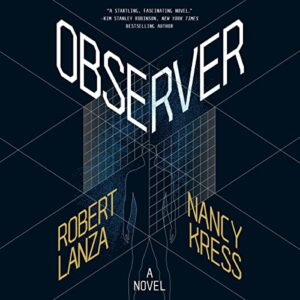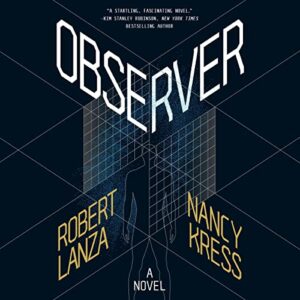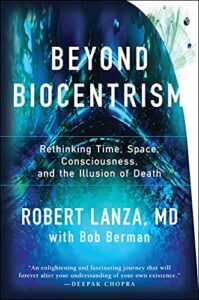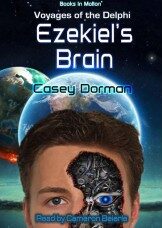
Observer by Robert Lanza and Nancy Kress
Story Plant: 2023
Sometimes scientists turn to science fiction to express their ideas in fiction and have the freedom to use their speculations in a way that academic publishing doesn’t allow. Fred Hoyle, Carl Sagan, Gregory Benford, to name a few, have done this with very positive results. I, myself, have published far more academic research articles and conference papers than I’ve written novels, but one of my earliest sci-fi novels, I, Carlos, about a computer chip implanted in a subject’s brain and taking over his behavior, was written directly as a result of my ideas on AI consciousness being rejected from several academic journals, and, frustrated at trying to express them in the heavily referenced, closely tied to the data manner demanded by journal editors, I decided to write a novel where I could dramatize them and wouldn’t need citations. That was 2004, and the ideas are more mainstream now, but I still prefer the freedom of science fiction as a way of including both the facts and the speculation together in the form of a character and plot.
Robert Lanza is a respected scientist, whose expertise in in stem cell research, although his most popular books and his science fiction novel, Observer, deal with physics and consciousness. He’s teamed with one of the most accomplished science fiction writers, multiple award winner, Nancy Kress, to produce an intriguing, exciting, and highly entertaining novel. The science involved is Lanza’s interpretation of the meaning of several quantum theory experiments, most notably the double-slit experiment and demonstrations of entanglement, as well as Wheeler’s concept of quantum foam. In a previous review, I’ve examined Lanza’s ideas derived from these experiments, which constitute his theory of Biocentrism. I was not impressed. On the other hand, Observer is a fun read, with distinctive characters, complicated situations, a multi-level plot and a surprise ending. The references to biocentrism are all there, in fact, they take up a fair amount of the novel, usually as a lecture by one person to another. Like other scientists who wrote sci-fi, Lanza extends his theory into more speculative realms in this fictional novel, allowing characters to create their own alternative universe according to their desires and in some cases to inhabit it, along with others who had died in the universe the rest of us live in.
In my previous review of Beyond Biocentricsm, I vowed to keep my scientific skepticism under wraps while reading Observer, and I didn’t have much difficulty doing so. I let myself enjoy the speculative implications of Lanza’s interpretations of quantum theory research and the way they were woven into the plot. The manner of presenting them as toned-down academic lectures inserted in the middle of an ongoing plot was not as successful as using the ideas to create a world based on them and embedding the plot within it, as Gregory Benford did with Larry Niven, in his Bowl of Heaven series, but it still worked (though I suspect some readers will skip these parts of the story).
Observer has gotten a very favorable response from reviewers and readers, and deservedly so. It’s an interesting, mind-expanding thriller and introduces the reader to some real science. But it also presents, as science fiction should, a lot of speculative science. There is no scientific basis for the idea that quantum theory proves that death does not exist, nor that one could voluntarily create their own universe. Even its version of the multiverse theory, which is speculative itself, but based on mathematics, differs from the most accepted version of this idea, which is, if multiverses exist, they are essentially nanoverses, so small that existing in them would be impossible (so are wormholes, but that hasn’t stopped sci-fi writers from using them to propel spaceships from one part of the universe to another). A basic problem of the biocentrism theory behind Observer is that it interprets ‘observer effects” in situations such as the double-slit experiment as due to human observers “watching” or “knowing” the events in the experiment. In fact, the same effects appear when a machine records them with no human present, which is overwhelmingly how they are observed. Scientists talk about “measuring” the results of such experiments and interpretations of the decoherence or collapse of the wave function into a particle that occurs is discussed as a result of interactions between the measuring apparatus (not the human) and the photon or electron involved. A standard mantra of science is that all measurement is an interaction between the device doing the measuring and the object being measured. At the quantum level, such interaction has “spooky” effects, such as decoherence. Lanza’s interpretation that the spooky results are a result of human consciousness is not a bizarre one, others have voiced it, but it is not the accepted one.
Why is all this important? I enjoyed the book by suspending my skepticism about the science behind it. I suspended my skepticism, because I was familiar with the quantum effects and the various interpretations of them, and I had previously concluded that biocentrism, as a scientific theory, was lacking and contained not just scientific, but logical errors. Many readers of both Lanza’s more scientific books and Observer, have suspended their skepticism because it is a sexy theory that offers a way around some of life’s most difficult obstacles, such as death. The theory and the books are creating a cult following. I am reminded of James Redfield’s The Celestine Prophecy, which came out in the early 1990’s and achieved a similar cult status. It did no harm and even I enjoyed the book. The same is true of Observer, and that’s Ok. In fact, it will probably have the effect of getting enough people interested in quantum theory and its implications that they decide to learn a little more about the topic, which can’t hurt if they don’t just flock to the popular accounts that support one interpretation or another. Even I, a true skeptic, know that Lanza’s interpretation can’t be ruled out at this time, which is why I read one of his other books to find out exactly what it was.
All in all, this is a very worthwhile book to read and one that most people will enjoy. That’s good. That’s what books, particularly fiction books, are for. I recommend it but with the reservations about taking it seriously, as I’ve outlined above.
Can an AI be superintelligent, and if so, should we fear it? Read Casey Dorman’s novel, Ezekiel’s Brain on Amazon. Available in paperback and Kindle editions
Rather listen than read? Download the audio version of Ezekiel’s Brain from Audible.
Subscribe to Casey Dorman’s Newsletter. Click HERE








“In fact, it will probably have the effect of getting enough people interested in quantum theory and its implications that they decide to learn a little more about the topic, which can’t hurt if they don’t just flock to the popular accounts that support one interpretation or another.” That’s my favorite sentence here! And isn’t the last part (“which can’t hurt if they don’t just flock to popular accounts that support one interpretation or another”) a requirement for nurturing an open mind in order to facilitate humankind’s obvious mandate to “keep on keeping on.”